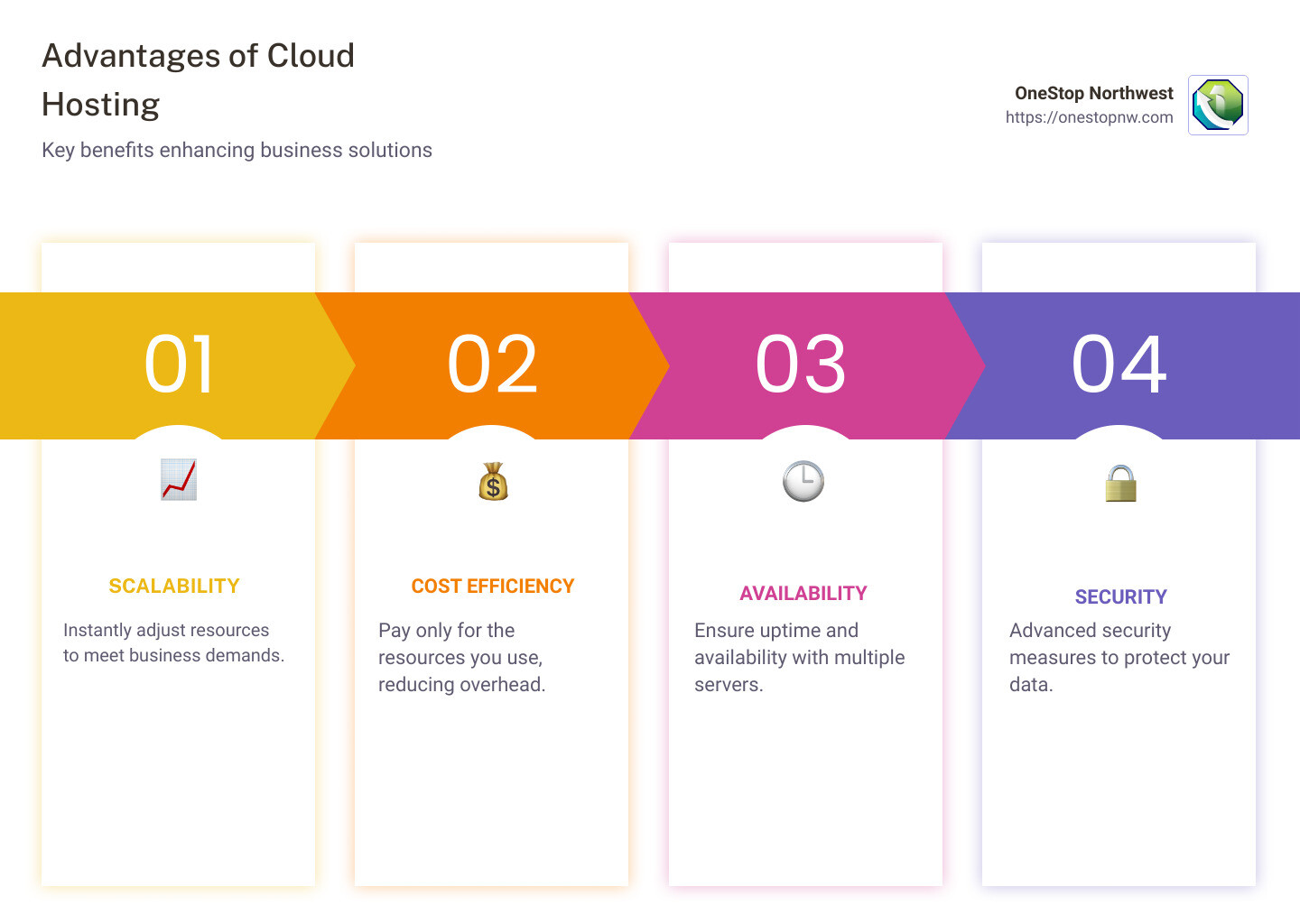Cloud Server Options: Top 5 Excellent Choices 2024
Cloud server options are changing the business landscape, providing unparalleled flexibility, scalability, and efficiency. For those seeking quick insights, here’s what you need to know:
- Cloud Hosting – Offers multiple servers, ensuring resources are dynamically allocated during traffic spikes.
- Cloud Computing – Uses internet-based remote servers for data management, storage, and processing.
- Scalability – Adjust resources instantaneously to match your business needs, scaling up or down as required.
With cloud server solutions, companies can maintain uptime, improve security, and effectively manage costs—key factors for small business owners balancing budget and growth needs.
As Dylan Cleppe from OneStop Northwest, I’ve seen how strategic use of cloud server options drives business success. With over two decades of helping businesses streamline operations, I’m here to guide you through the cloud landscape, ensuring you make informed decisions custom to your unique business needs.

Types of Cloud Servers
When diving into cloud server options, it’s crucial to understand the different types available. Each type caters to various needs and offers unique benefits. Let’s break down the four main types: public cloud, private cloud, hybrid cloud, and managed cloud.
Public Cloud
The public cloud is like renting an apartment in a busy city. A third-party provider owns and manages the entire infrastructure, offering services to multiple clients over the internet. This setup is perfect for businesses that need to scale quickly without owning physical hardware. Companies like Amazon Web Services (AWS) and Google Cloud Platform (GCP) dominate this space, providing robust services and global reach. With the public cloud, you pay for what you use, making it cost-effective for startups and small businesses.
Private Cloud
In contrast, a private cloud is akin to owning your own house. You control everything—from the hardware to the software. This setup offers improved security and customization, ideal for organizations with strict data privacy requirements. Large corporations often prefer private clouds to ensure their sensitive data remains secure. While it requires significant investment in infrastructure and management, the private cloud provides best control and privacy.
Hybrid Cloud
A hybrid cloud combines the best of both worlds, blending public and private cloud environments. It’s like having a home and a vacation rental—flexibility to use either based on your needs. This setup allows businesses to keep sensitive data in a private cloud while leveraging the public cloud for less critical tasks. Hybrid clouds offer seamless data integration and scalability, making them a popular choice for businesses looking to optimize resources without compromising security.
Managed Cloud
Lastly, the managed cloud is like hiring a property manager for your rental. Here, a third-party provider manages your cloud infrastructure, handling everything from security to updates. This allows businesses to focus on core activities without worrying about the technical details. Managed cloud services are ideal for companies that lack in-house expertise or want to reduce operational burdens. Providers like Liquid Web offer managed cloud solutions, ensuring that businesses can operate efficiently with expert support.
With these cloud server options, businesses can choose a solution that aligns with their specific needs, ensuring optimal performance and cost-efficiency. Understanding these types helps in making informed decisions, setting the stage for successful cloud integration.
Top Cloud Server Providers
When considering cloud server options, know the key players in the market. Each provider offers unique features and caters to different needs. Let’s explore the top cloud server providers: Amazon Web Services (AWS), Microsoft Azure, Google Cloud Platform (GCP), DigitalOcean, and OVHCloud.
Amazon Web Services (AWS)
AWS is the undisputed leader in cloud hosting. It’s like the Swiss Army knife of cloud services, offering everything from basic computing power to advanced machine learning tools. AWS’s global network of data centers ensures low latency and high availability, making it a top choice for businesses with a global presence. The pay-as-you-go pricing model appeals to startups and small businesses looking to scale without breaking the bank. However, AWS can be overwhelming for newcomers due to its vast array of services.
Microsoft Azure
Microsoft Azure is perfect for enterprises already using Microsoft products like Office 365. Azure’s seamless integration with these tools makes managing cloud resources a breeze. It’s ideal for handling complex workloads, thanks to its global data centers. Azure’s scalability is a highlight, allowing businesses to start small and grow as needed. But be prepared for a complex user interface and pricing model, which can be challenging to steer.
Google Cloud Platform (GCP)
GCP shines in performance and security. It’s built to handle a wide range of workloads, making it ideal for businesses expecting growth. GCP’s integration with powerful tools like Kubernetes Engine and BigQuery sets it apart. However, it tends to be more expensive than competitors. For those who prioritize performance and security, GCP is worth the investment.
DigitalOcean
DigitalOcean is the go-to for budget-conscious businesses. It’s like the fast-food joint of cloud hosting—simple, reliable, and affordable. DigitalOcean’s transparent pricing and ease of use make it attractive for startups and small projects. While it may not offer the advanced features of AWS or Azure, it excels in providing straightforward, cost-effective solutions.
OVHCloud
OVHCloud is a major player in Europe, offering robust cloud solutions with a focus on European customers. It’s the largest cloud hosting provider in Europe, providing a range of options from virtual private servers to dedicated servers. OVHCloud is a cost-effective choice for businesses with a significant European presence. However, customer support may not be as strong as that of other providers, which could be a drawback for some businesses.
With these top cloud server options, businesses can find a provider that aligns with their specific needs, whether it’s AWS’s versatility, Azure’s integration, GCP’s performance, DigitalOcean’s affordability, or OVHCloud’s European focus. Understanding these providers helps in making informed decisions, setting the stage for successful cloud integration.
Benefits of Cloud Hosting
Cloud hosting is a game-changer for businesses of all sizes. It offers a range of benefits that can boost your business operations and give you a competitive edge. Let’s explore some of the key advantages:
Scalability
One of the most significant benefits of cloud hosting is scalability. Unlike traditional hosting, where you have to predict your needs and pay for unused resources, cloud hosting allows you to scale up or down based on demand. This means you can handle traffic spikes without a hitch and save money when things are quiet. For example, many cloud providers offer dynamic scaling options that can automatically adjust resources in real time, ensuring your application runs smoothly regardless of traffic fluctuations.
Availability
Cloud hosting offers high availability thanks to its global network of data centers. Many providers have data centers all over the world, which means your website can be accessed quickly from anywhere. This reduces latency and ensures your services are always up and running. Moreover, cloud providers invest in technologies like load balancers and failover mechanisms to improve service reliability.
Cost Efficiency
Cloud hosting is a cost-effective solution, especially for startups and small businesses. Traditional hosting requires significant upfront investments in hardware and ongoing maintenance costs. In contrast, cloud hosting operates on a pay-as-you-go model, where you only pay for the resources you use. This eliminates waste and makes budgeting easier. Some providers are known for their transparent pricing, making it an attractive option for those with tight budgets.
Security
Security is a top priority for cloud providers. They invest heavily in robust security systems to protect your data. With features like SSL certificates, firewalls, and regular backups, cloud hosting ensures your data is safe from cyber threats. Many providers offer end-to-end security and compliance features, which are crucial for businesses handling sensitive data. This means you can focus on growing your business without worrying about data breaches.
Time to Market
Cloud hosting can significantly speed up your time to market. Setting up physical hardware and infrastructure can take weeks or even months. With cloud hosting, you can deploy new applications and updates in minutes. This agility allows businesses to respond quickly to market changes and customer demands. Some services provide continuous integration and delivery, helping you roll out features faster and stay ahead of the competition.
By leveraging these benefits, businesses can optimize their operations, reduce costs, and deliver exceptional user experiences. As we explore cloud server options for different needs, understanding these advantages will help you choose the best solution for your business.
Cloud Server Options for Different Needs
Choosing the right cloud server options can make a big difference, whether you’re a small business, an individual, or a large enterprise. Let’s break down the best choices for each scenario.
Small Business
For small businesses, budget and simplicity are often top priorities. That’s where providers like DigitalOcean and A2 Hosting come in. DigitalOcean offers a straightforward pricing model with no hidden fees, which is perfect for tight budgets. Their pre-configured droplets make it easy to get started without needing deep technical knowledge.
A2 Hosting, on the other hand, provides high-speed SSD storage and Turbo servers. This ensures fast load times, which is crucial for user experience and search engine rankings. Plus, their free site migration service can save you time and hassle if you’re switching from another provider.
Personal Use
When it comes to personal projects or small websites, you want something that’s easy to manage and affordable. Google Cloud Platform (GCP) offers flexible solutions that can scale as your needs grow. For hobbyists or personal websites, GCP’s pay-as-you-go model means you only pay for what you use, which keeps costs low.
Additionally, platforms like AWS provide free tiers for certain services, which can be a great way to experiment and learn without financial risk. This is ideal for students or individuals just starting out with cloud hosting.
Enterprise Solutions
Enterprises need robust solutions that can handle complex workloads and provide excellent security. Amazon Web Services (AWS) and Microsoft Azure are top picks in this category. AWS offers a comprehensive range of services, from basic computing to advanced machine learning tools, making it versatile enough for any business need. Its global data center network ensures low latency and high availability, crucial for a global company.
Microsoft Azure shines with its integration capabilities, especially if your business already uses Microsoft products like Office 365. Its global infrastructure ensures that your applications are always up and running, providing a seamless experience for users worldwide.
Managed Hosting
If managing a server sounds daunting, managed hosting might be the way to go. Providers like OVHcloud offer solutions where the hosting company takes care of the technical details, including updates, security, and backups. This allows you to focus on your business rather than IT headaches.
OVHcloud’s public cloud solutions are designed to be reliable and secure, with a 99.999% SLA. They also provide specialized solutions for industries like gaming and AI, making them a versatile choice for businesses with specific needs.
By understanding these options, you can choose the right cloud server solution that aligns with your specific requirements, whether it’s simplicity, cost-effectiveness, or powerful enterprise features.
Frequently Asked Questions about Cloud Server Options
What are the different types of cloud servers?
When it comes to cloud server options, there are three main types to consider: public cloud, private cloud, and hybrid cloud.
-
Public Cloud: This is like renting a room in a large hotel. A third-party provider, such as AWS or Microsoft Azure, manages the infrastructure. You share resources with other users, but you don’t have to worry about maintenance. It’s great for businesses that need flexibility and scalability without the hassle of managing hardware.
-
Private Cloud: Imagine owning a private villa. Here, your organization manages its own cloud infrastructure. This setup offers more control and security, making it ideal for businesses with strict data privacy needs.
-
Hybrid Cloud: This is the best of both worlds. You combine public and private clouds, allowing data and applications to be shared between them. It’s perfect for businesses that need the flexibility of a public cloud but also have sensitive data that requires a private cloud.
What is the best cloud server for small businesses?
Small businesses often prioritize affordability and ease of use. DigitalOcean and A2 Hosting are excellent choices here.
-
DigitalOcean: Known for its transparent pricing and simplicity. You can quickly set up virtual servers (called droplets) without needing deep technical skills. It’s perfect for startups or businesses on a budget.
-
A2 Hosting: Offers high-speed performance and user-friendly features. Their Turbo servers ensure fast load times, crucial for keeping customers happy and improving search rankings.
Both options provide the essential features small businesses need without unnecessary complexity or high costs.
How does cloud hosting differ from traditional hosting?
Cloud hosting and traditional hosting are like comparing a modern apartment complex to an old single-family home.
-
Virtual Servers: Cloud hosting uses virtual servers that pull resources from multiple physical servers. This means you can scale up or down easily, like adding or removing rooms in an apartment complex. Traditional hosting relies on a single server, which can limit scalability.
-
Scalability: With cloud hosting, you can adjust resources on demand. This is crucial for businesses that experience fluctuating traffic. In contrast, traditional hosting requires upgrading to a different plan or server, which can be cumbersome.
-
Reliability: Cloud hosting offers better reliability. If one server fails, another takes over, ensuring your site stays online. Traditional hosting might mean downtime if the server goes down.
In summary, cloud hosting provides flexibility, scalability, and reliability, making it a superior choice for modern businesses compared to traditional hosting.
Conclusion
In today’s digital landscape, choosing the right cloud server options is crucial for your business’s success. At OneStop Northwest, we understand that your digital presence is more than just a website—it’s the foundation for your business operations and growth.
Our expertise in cloud server options ensures that you get a solution custom to your needs, whether you’re a small business, a large enterprise, or anything in between. With the flexibility of public, private, and hybrid clouds, we can help you find the perfect balance between cost efficiency, scalability, and security.
OneStop Northwest is committed to providing digital solutions that empower your business. Our services include everything from custom web design to SEO optimization, ensuring that your online presence is not only robust but also optimized for success. We pride ourselves on offering comprehensive solutions that cover all aspects of your business’s digital and physical presence.
We believe in making technology accessible and beneficial for all businesses. Our personalized consultations are designed to align with your specific objectives and challenges, helping you steer the complexities of cloud hosting with ease.
Ready to lift your business with the right cloud server options? Explore our web hosting services and see how we can help you build a powerful, effective, and secure online presence. Let’s work together to create a digital foundation that supports your business today and prepares it for the opportunities of tomorrow.


